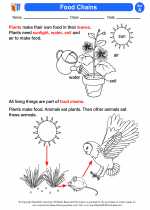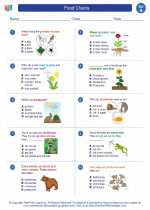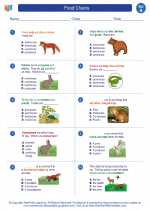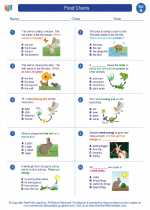Decomposers
Decomposers are an important part of the ecosystem. They are organisms that break down dead plants, animals, and other organic matter. Decomposers play a crucial role in the recycling of nutrients in an ecosystem, as they break down complex organic materials into simpler substances that can be used by other organisms.
Types of Decomposers
There are various types of decomposers, including bacteria, fungi, and some types of insects. Each of these organisms has its own unique way of breaking down organic matter.
Bacteria
Bacteria are single-celled organisms that are found nearly everywhere. They are very efficient at breaking down organic matter and are responsible for the initial stages of decomposition.
Fungi
Fungi, such as mushrooms and molds, are also important decomposers. They secrete enzymes that break down complex organic compounds, allowing the fungi to absorb the simpler nutrients.
Insects
Some insects, such as beetles and maggots, also play a role in decomposition. They help break down organic matter by feeding on it and breaking it into smaller pieces.
Importance of Decomposers
Decomposers are essential for the health of an ecosystem. Without them, dead organic matter would accumulate and nutrients would become locked up, making it difficult for new plants to grow. Decomposers ensure that nutrients are returned to the soil, where they can be taken up by plants and reused in the food chain.
Study Guide
Questions:
- What are decomposers?
- Why are decomposers important in an ecosystem?
- Name three types of decomposers and describe their roles.
- What would happen to an ecosystem if there were no decomposers?
Activities:
- Take a nature walk and try to identify different types of decomposers in your environment.
- Set up a small compost bin at home and observe the decomposition process over time.
- Research the role of decomposers in specific ecosystems, such as forests, grasslands, or aquatic environments.
Studying decomposers is not only fascinating but also crucial for understanding the interconnectedness of living organisms in an ecosystem. I hope this study guide helps you in your exploration of this important topic!
.◂Science Worksheets and Study Guides First Grade. Food Chains

 Activity Lesson
Activity Lesson
 Worksheet/Answer key
Worksheet/Answer key
 Worksheet/Answer key
Worksheet/Answer key
 Worksheet/Answer key
Worksheet/Answer key
 Worksheet/Answer key
Worksheet/Answer key
 Vocabulary/Answer key
Vocabulary/Answer key
 Vocabulary/Answer key
Vocabulary/Answer key
